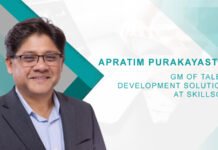Hi Darren, welcome to HRTech Cube! Could you kindly share a bit about your professional journey at Skillsoft?
Thank you for having me. I recently joined Skillsoft, bringing 25 years of global leadership experience and a decade in the education sector. In this role, I’m focused on leading Global Knowledge, Skillsoft’s instructor-led training (ILT) sector, and enhancing our live learning offerings. Most recently, I was Chief Operating Officer at QA, a leader in digital and tech reskilling in the UK, where I led the rollout of the strategic company vision.
I come from a transformation background. Moving to QA and now Skillsoft, the transition into the tech workspace has demonstrated how pivotal ILT can be in driving the reskilling agenda and supporting our learners in closing skills gaps.
Skillsoft promotes blended learning experiences. Could you explain why combining formats like videos, books, mentors, and bootcamps is essential for building a more adaptive workforce?
Blended learning is crucial because it caters to different learning styles and preferences. In short, it’s a more effective approach for talent development and closing organizational skills gaps.
Based on recent research from Skillsoft, learners are advocating for a combination of video-based, interactive, and live, instructor-led training in particular. By incorporating these methods with AI tools, books, and more we create a more holistic and engaging learning experience.
This approach allows learners to access content in a way that suits them best, whether it’s via visual, auditory, or hands-on models. It also ensures that learning is continuous and adaptable, helping employees stay relevant and agile in a rapidly changing work environment.
What key trends have you observed in how organizations are adopting blended learning to upskill their teams and enhance employee engagement?
One key trend is the increasing emphasis on personalized learning paths. Organizations are recognizing the importance of tailoring learning experiences to each employee’s needs and career goals. The rise of the skills taxonomy, skills-based organizations, and skills-based hiring is a great indicator of this. Over the past decade, blended learning has expanded from simply teaching the same content digitally to incorporating new technologies with gamification, AI, and hands-on experiences.
Additionally, there’s a growing focus on using data and analytics to measure the effectiveness of learning programs and make informed decisions. With blended learning models, companies can personalize individual learning paths based on the results of one employee to another: Did this worker retain knowledge better after working with an AI coach? Were they more engaged learning from a live instructor?
Blended learning is a great boon to companies building and refining their talent development programs, especially as new data indicates top barriers to skilling include lack of time and learning formats.
How is AI, particularly tools like Skillsoft’s CAISY™ (Conversation AI Simulator), transforming the way learners develop and apply new skills?
AI tools like Skillsoft CAISY™ are revolutionizing learning by providing personalized and interactive experiences. CAISY simulates difficult conversations employees often encounter at work, allowing them to practice and refine their skills in a safe, zero-consequences environment. This technology helps learners build confidence and competence, making it easier to apply new skills in their roles, particularly with delicate or one-time conversations that can be hard to practice intentionally. AI also enables continuous feedback and improvement, ensuring that learning is always relevant and effective.
One-on-one teaching, like what is simulated by CAISY, keeps the focus on the individual learner, meeting them where they’re at and working on precise, unique challenges. CAISY is an invaluable tool that complements larger ILT classes – where ILT provides interpersonal skills and encourages various perspectives, CAISY is a personal tutor dedicated just to the learner.
Could you share some examples of how Skillsoft’s AI Skills Accelerator GenAI courses have positively impacted productivity and innovation in the workplace?
For all the benefits that GenAI presents to businesses, if the workforce isn’t appropriately skilled, they won’t be able to realize them at scale. Organizations cannot deploy a new tool to their team members and leave it to them to figure out how to use it. This approach leads to fear and confusion, lackluster results, and misuse of technology. By upskilling employees to use GenAI tools effectively, organizations can drive their business forward and create a culture of successful experimentation and innovation.
With this in mind, our AI Skills Accelerator is designed to advance organizations and their talent through critical phases of AI maturity and help them leverage emerging tools like Copilot and Azure AI. Pilots of the AI Skills Accelerator GenAI courses, developed in collaboration with Microsoft, showed 98% of learners were immediately able to apply the knowledge they had gained to their day-to-day work. Additionally, when taking a pre-assessment AI skill benchmark to measure their competency, learners reported an average 23-point skill gain after participating in our AI Skill Accelerator.
Research shows intentional application of AI can lead to an as much as 45% gain in productivity, especially in fields where automation can thrive. The courses provide employees with the skills they need to leverage AI technologies effectively at work, leading to more efficient processes, innovative solutions, and improved business outcomes.
In your view, how does AI help organizations reach different levels of performance in their skills transformation initiatives?
AI-driven platforms and tools offer a comprehensive and personalized learning journey, allowing organizations to expand their collective toolbox and empowering individual learners to reach new heights. With tools like CAISY, leaders can enhance the learning experience and ensure employees are better prepared for real-world scenarios.
Additionally, AI enables organizations to track and measure the progress of their skills transformation initiatives effectively. By analysing data on skill proficiencies, employers can identify areas of strength and improvement, allowing them to take proactive measures to enhance their workforce’s capabilities. This data-driven approach ensures that training programs are aligned with business objectives and that employees are equipped with the skills needed to drive organizational success.
By leveraging AI, organizations can create a more agile and adaptive workforce, capable of meeting the demands of a rapidly changing business environment.
What advice would you give to companies looking to effectively integrate AI-powered tools into their skilling strategies to remain competitive?
My advice would be to start by identifying the specific skills and competencies that are critical to your organization’s success. Then, measure and compare your workforce’s skills against industry standards to shape a more defined and effective skilling experience.
Look for AI-powered tools that can help you develop those skills in a personalized and scalable way. It’s also important to foster a culture of continuous learning and encourage employees to embrace new technologies. After implementation, use data and analytics to measure again the impact of your skilling initiatives and make data-driven decisions to optimize your learning programs. Assess, index, develop, and reassess.
It’s important to note, nearly 2/3 of respondents in Skillsoft’s recent State of Enterprise Skilling research consider their organization’s AI training average to poor. As I mentioned previously, businesses can’t enable new technologies without background and further support. AI development tools and AI-specific training go hand-in-hand.
Could you share your personal approach to continuous learning and staying ahead in a fast-paced industry like yours?
Continuous learning is essential in our industry, and I make it a priority to stay updated on the latest trends and technologies. I regularly attend our own ILT courses, participate in webinars, and read relevant publications. I also believe in the power of learning from peers and experts in the field. Everyone needs to learn on a consistent basis – that’s critical in a workforce with widening skills gaps and rapid technological change.
What recommendations would you offer organizations seeking to enhance their learning programs through AI and multimodal learning approaches?
Start with a clear understanding of your organization’s learning objectives and the specific needs of your employees. Explore AI-powered tools and multimodal learning models that can help you achieve those objectives. Be honest about the skills you’re looking for and know when to lean on an external expert or vendor, like Skillsoft. When it comes to immersive and innovative learning tools like AI coaches and curated pathways, those partners are invaluable for their expertise.
It’s also important to create a supportive learning environment and provide employees with the resources and opportunities they need to succeed. Second to implementing a talent development program is reassessing it to ensure learner needs are being met and organizational goals are achieved effectively. Understanding where you are, where you need to be, and what your skilling road map looks like are fundamental for real workforce transformation.
Looking ahead, what excites you the most about the future of AI in corporate learning and skills development?
I’m excited about the speed of change and the potential of AI to create truly personalized and adaptive learning experiences. I’m also excited about the possibilities for using AI to predict future skill needs and proactively develop training programs to address them.
Ultimately, AI is transforming corporate learning and skills development, making it more effective, efficient, and impactful.
Explore HRtech News for the latest Tech Trends in Human Resources Technology.

Darren Bance GM of Skillsoft Global Knowledge, Skillsoft
Darren has more than 25 years of global leadership experience, with a focus on technical education and skilling initiatives within both the public and private sector. He most recently served as the Chief Operating Officer of QA, one of the United Kingdom’s largest providers of IT and digital skills solutions, where he led the rollout of the strategic company vision and handled the day-to-day business operations across a variety of disciplines. Prior to that, he was the Managing Director of the Learning Services division of Capita Group, leading more than 1,000 employees. Previously, he was a Managing Partner at ShiftPoint ME, a digital enablement consultancy, and CEO of Restrata LLC, a security and risk technology subscription business.












